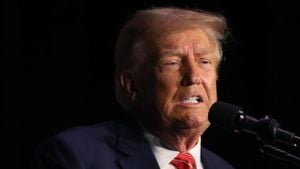Samsung Electronics has announced its intention to conduct one of the largest stock buyback programs in recent memory, setting the stage for repurchasing shares worth approximately 10 trillion won, which translates to around $7.2 billion. This massive buyback is aimed at boosting shareholder value, particularly following recent declines in the company’s stock price.
The decision, formalized by Samsung’s Board of Directors, outlines a phased approach over the next year. The first phase will involve repurchasing 3 trillion won worth of shares, beginning on November 18, 2024, and extending until February 17, 2025. This phase includes the acquisition of over 50 million common shares alongside nearly 7 million preferred shares.
Samsung's stock has faced significant hurdles recently, falling to its lowest point since June 2020. On November 14, the closing price was recorded at 49,900 won ($35.77), marking a notable dip attributed to disappointing earnings and market maneuvering amid uncertainties surrounding the semiconductor industry. Conditions have been particularly volatile with the looming economic policies under the incoming Donald Trump administration, casting shadows over global semiconductor trade dynamics.
Despite the recent downturn, Samsung is firmly committed to enhancing what it calls "sustainable shareholder value." There’s also mention of the company's intent to work on strategies to improve its long-term value, indicating confidence in its recovery and future potential. Notably, this is not the first time Samsung has turned to buybacks; the tech giant previously executed such programs, including one in 2017 whereby it repurchased shares totaling 9.3 trillion won and cancelled half of its treasury stock. The strategy aims to instill confidence among investors during challenging market conditions.
The upcoming buyback is strategically timed not just as a reaction to its stock performance, but also as part of Samsung’s broader efforts to bolster its business segments. Recently, the company registered net income figures hitting $7.1 billion for the third quarter of 2024, with $2.8 billion stemming from its semiconductor division alone. This growth was spurred by increasing demands within the artificial intelligence (AI) and data center sectors, two fields where Samsung continues to strengthen its foothold.
Nevertheless, it faces competition for market share—particularly with rivals like SK Hynix and Micron gaining ground. Delays such as NVIDIA’s AI chip certification have allowed competitors to secure advantageous positions, especially within high-bandwidth memory sales. Mobile chip sales have also seen reductions due to necessary inventory adjustments, adding layers of complexity to Samsung's operational dynamics.
The announcement resonates not just within corporate circles; it also serves as reassurance to shareholders and the market at large, reflecting Samsung's proactive stance amid fluctuational markets. To wrap up the plan, details of the remaining 7 trillion won worth of shares will be fleshed out with future board meetings aimed at ensuring the best approach to maximizing shareholder interests.
While the buyback program seeks to mend declining investor sentiment, Samsung's next moves and strategic pivots, particularly in AI and other technology sectors, will be closely watched by analysts and investors alike. The focus now turns to how these repurchases intersect with market demand and Samsung's broader operational strategy amid the technological arms race within the semiconductor space.



